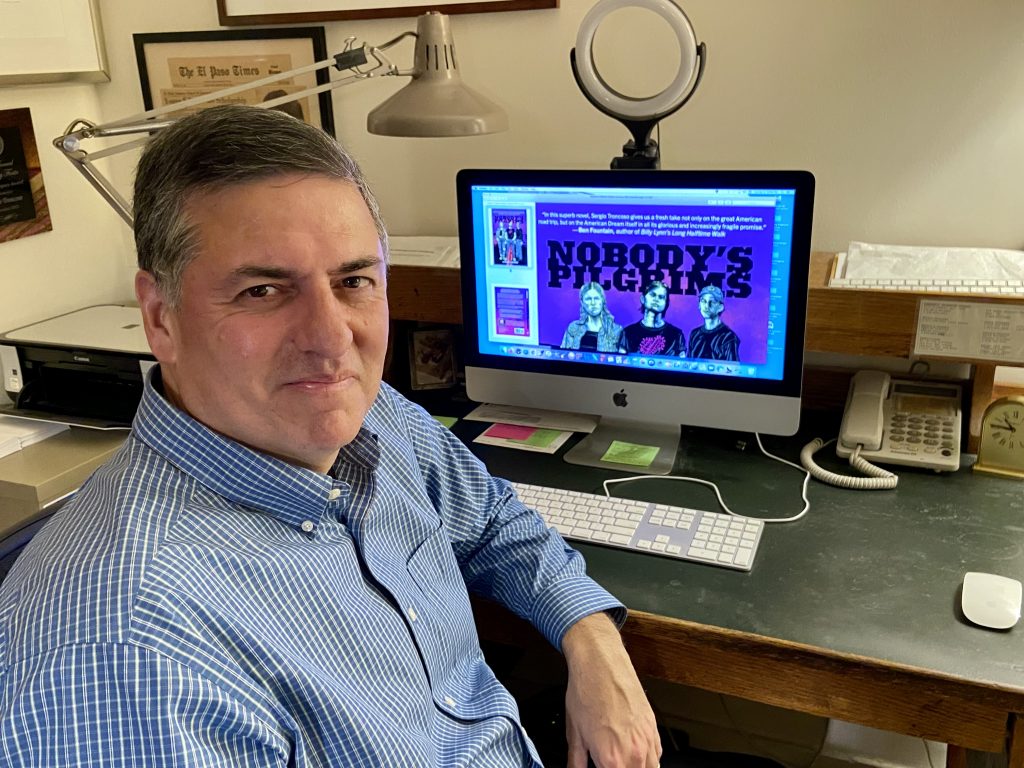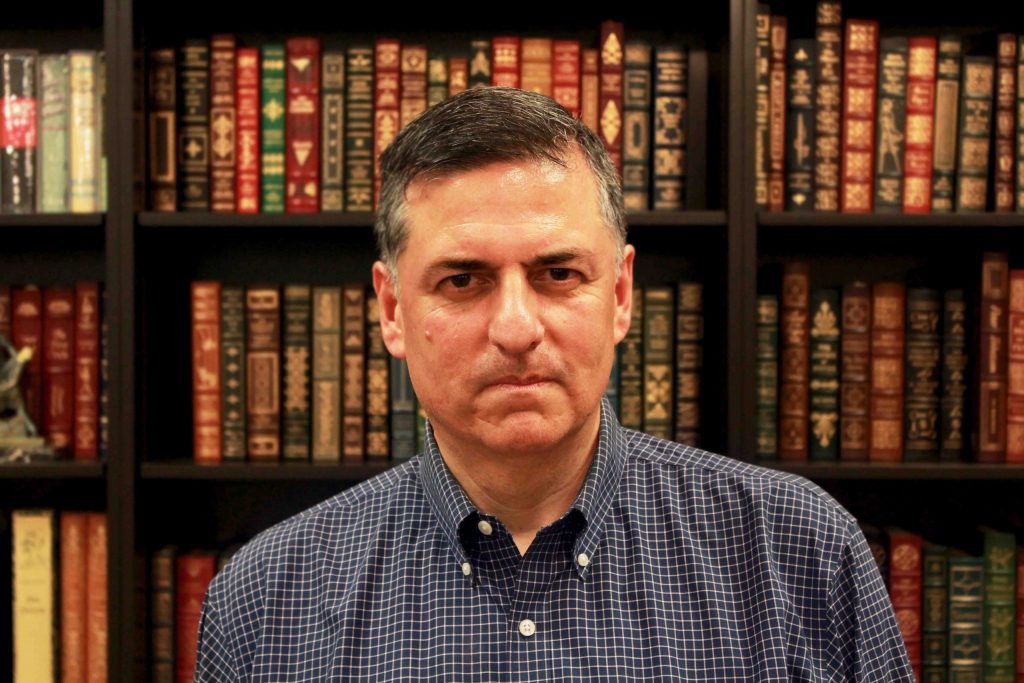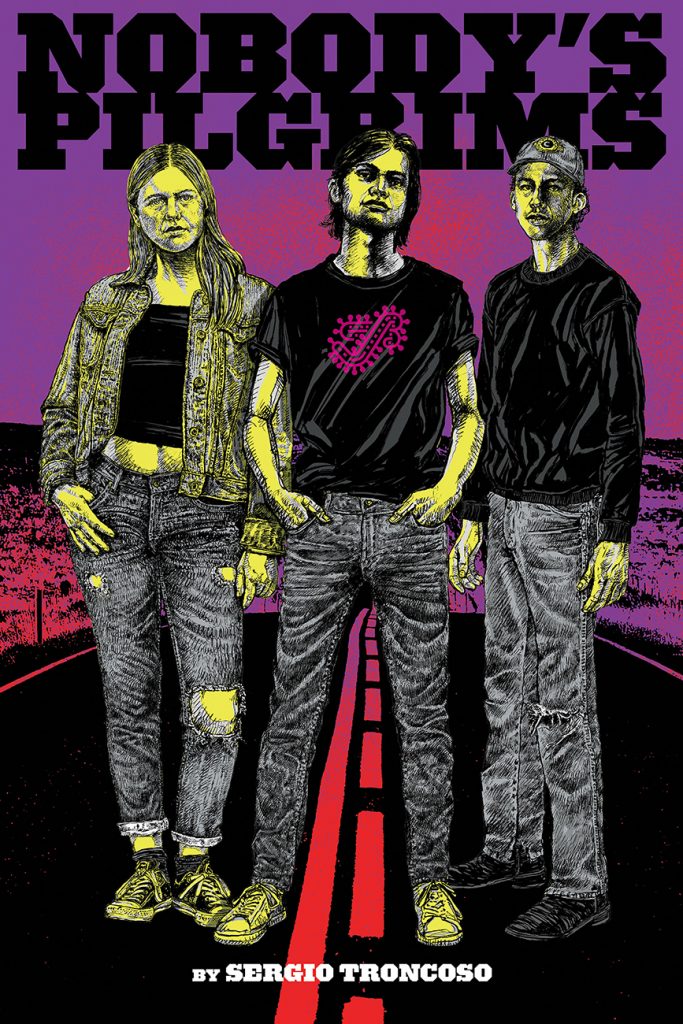In this guest post, author Sergio Troncoso reflects on writing a pandemic story before the pandemic and the many themes of his latest novel, including “the border beyond the border,” survival, identity, and more. Nobody’s Pilgrims is available for purchase now.
Can imagination be a window into a possible future? Yes, indeed it can. I wrote my novel, Nobody’s Pilgrims, before twenty cases of COVID-19 existed in the United States. I actually turned in the final final draft of my novel to my publisher, Cinco Puntos Press, on leap day, February 29, 2020. Moreover, most of the novel had been written even earlier. And what was the novel about? Three runaway teenagers, Turi, Arnulfo, and Molly, pursued by evil people across a dystopian United States collapsing because of a pandemic.
So what happened to my novel? Well, the owners of Cinco Puntos Press decided to retire. The pub date—originally in the first half of 2021—was pushed to the fall of 2021 pending the sale. Lee & Low bought Cinco Puntos Press—thank goodness!—but to be able to absorb the pending titles and all of the work to integrate the new backlist, the pub date of Nobody’s Pilgrims eventually became May 10, 2022. And now, hallelujah, we are finally there!
As the COVID-19 pandemic mushroomed into thousands, tens of thousands, and now almost one million deaths in the U.S., a social and personal nightmare also unfolded for many of us during the past two years. We are now apparently emerging from this darkness, in a different world. But a version of that pandemic nightmare remained unread in my novel that somewhat predicted what might happen to us, or at least to three resilient and gritty teenagers. Turi, Arnulfo, and Molly face their own personal dramas as well as struggle against the Marburg-B, a virus transmissible not through the air like COVID-19 but by direct contact with another.
During these past two years, I was on the one hand frustrated that Nobody’s Pilgrims had not been published in a timely manner. Would anyone believe that my novel had not only been conceived, but completely written and rewritten, before most of us had any news of COVID-19? And on the other hand, as a voracious reader, I wondered if other readers would want to read Nobody’s Pilgrims after the fears, traumas, and politics of COVID-19. I believe we were, and probably are, exhausted as a society with our very real pandemic.
But Nobody’s Pilgrims is about moral grit and survival and even love among the worst of times in my imagined America. It is an adventure story about overcoming your past, if you have grown up poor and alone along the United States-Mexico border like Turi and Arnulfo, or even in a small town in Missouri like Molly. It is also a story about a theme I call ‘the border beyond the border,’ in which the people who might have begun on the border have traveled deep into the American heartland to find their dreams, to discover new selves, and to fight against those who do not want them in the heartland. How do these ‘pilgrims’ find themselves to create a new community? The theme of the border beyond the border is also about the intimate and dark connections of the drug trade in both countries. We are all connected with each other, and with the good and evil around us.

I hope readers exhausted by COVID-19 will pick up Nobody’s Pilgrims and find laughter, excitement, and even a lesson or two in the trials of Turi, Arnulfo, and Molly. I too grew up dirt poor along the border, in Ysleta on the eastern outskirts of El Paso. And what that upbringing taught me was to survive. Many of my most important lessons came from my father and mother and my maternal grandmother. I have always believed that without Doña Dolores’s toughness and grit, without her stories about surviving as a teenager during the social chaos of the Mexican Revolution, I would not have survived as I traveled thousands of miles from my border home. When I wanted to quit at Harvard College…when I felt out of place because of my accent or working-class origins…when another door was slammed in my face…when I hated myself and the displacement caused by my own ambition, I always remembered what Doña Dolores would demand of me: “Do not come back with your tail between your legs! This is what you wanted. Show them who you are!”
The greatest mystery to me is why my abuelita wanted to connect with others who were not necessarily like her. My parents were the same way. They were proud to be Mexican, and my abuelita was particularly proud to have had uncles fight and die for Francisco Villa. But all of them were also truthful about their criticism of Mexico and even Villa, and why they willingly became immigrants in the United States. I guess it was about survival. It was about finding help with whoever would help you, even if they were different from you. They became friends with other poor people on the border, with anyone who would give them a chance. Their sense of pride was about challenging themselves, and challenging others, to be better than our prejudices and quick, mistaken judgments.
As the United States descended into our COVID chaos—with our fears about each other and our sense of community often in tatters—many of my abuelita’s lessons about survival were at the forefront of my mind. The lessons are about how to create a ‘we’ by judging people by what they do and not by relying on who you think they are. The lessons are about believing in yourself, even if you are an outsider, even if you don’t belong, even if others attack you for no good reason. The lessons are about how we have evil people often trying to tear us apart, trying to encourage quick, mistaken judgments, trying to exploit social chaos to further divide us. Finally, the lessons are about how we should fight back and how to create a ‘we’ to survive together.
Order your copy of Nobody’s Pilgrims:
Lee & Low Books
Indie Bound
Bookshop
Barnes & Noble
Amazon
. . . or wherever you order your favorite books!

Sergio Troncoso was born and raised in El Paso, Texas. His previous works include A Peculiar Kind of Immigrant’s Son, From this Wicked Patch of Dust, and The Last Tortilla. He often writes about the United States-Mexico border, immigrants, families and fatherhood, and crossing cultural, religious, and psychological borders. Among the numerous awards he has won are the International Latino Book Award for Best Collection of Short Stories, Kay Cattarulla Award for Best Short Story, Premio Aztlan Literary Prize, Southwest Book Award, Bronze Award for Essays from ForeWord Reviews, and the Silver and Bronze Awards for Multicultural Fiction from ForeWord Reviews. Troncoso has taught fiction and nonfiction at the Yale Writers’ Workshop in New Haven, Connecticut for many years. He has served as a judge for the PEN/Faulkner Award for Fiction and the New Letters Literary Awards in the Essay category. His work has recently appeared in New Letters, Yale Review, Michigan Quarterly Review, Texas Monthly, and New Guard Literary Review. The son of Mexican immigrants, Troncoso grew up on the east side of El Paso in rural Ysleta. He graduated magna cum laude from Harvard College and received two graduate degrees in international relations and philosophy from Yale University. A Fulbright scholar, Troncoso was inducted into the Hispanic Scholarship Fund’s Alumni Hall of Fame and the Texas Institute of Letters (TIL). He currently serves as TIL President.


